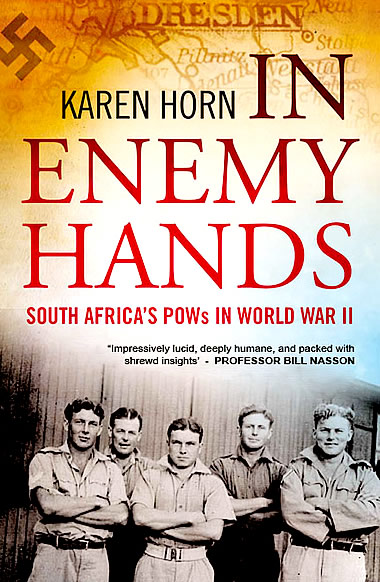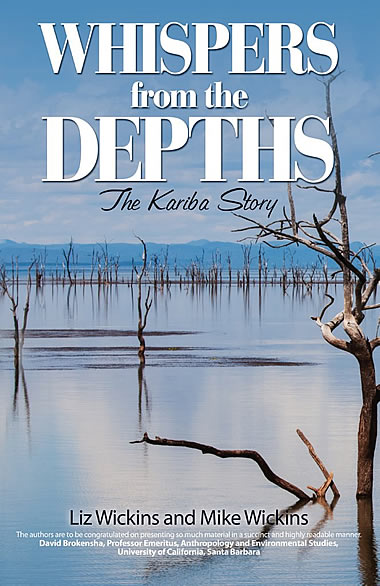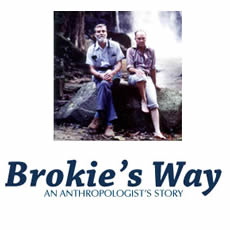BOOKS
I do not watch TV, although friends provide me with movies, which I enjoy watching on my computer. So, reading occupies much of my time. I try to buy at least one book a month from Kalk Bay Books, our local bookshop, and I also make regular visits to Fish Hoek library, which has a good collection. I usually check out (for a fortnight, renewable) five books, typically two non-fiction, often biographies (most recently of Chekhov and Mrs. Beeton), and three novels, including at least one detective story, preferably about an ethnic detective.
Karen Horn, a lecturer in history at Stellenbosch University recently launched her book In Enemy Hands, which is based on her Ph.D. dissertation on South African Prisoners of War during World War II. I was pleased to be asked to join her “in conversation” at the book launch, because reading her dissertation and discussing POW experiences with her, helped me to get my own experiences in perspective.

The cover photograph includes (from left to right) my brother Paul, Jack Mortlock, DWB, Harry Mortlock, Jake Jacobsen: we five formed a sort of “support group “ in our Dresden camp. I found it difficult to answer Karen’s question “How did being a POW affect you?” but I did have some tentative thoughts:
1) My five years in the SA army, including the three POW years, covered my age from 17 – 22, placing me in a structured environment,
(often far too structured for my taste), in the company of my elder brother Paul, and other good young men. This gave me a chance to grow up, to work out who I am, and prevented me from “going off the rails” or wandering hopelessly with no purpose – as happens to many young men at that testosterone filled period of their lives.
2) I do distinctly remember resolving that, when the war was over, (and we never doubted that we would win) I would do all that I could to stop myself being pushed around: I distinctly remember the German guard waking us at 5 a.m, on a wintry morning, “Raus! Raus! Alles raus!”. We were going to the Dresden Main Post Office for our morning shift. I resolved to be my own man, to the fullest extent possible, not simply to follow the herd. I do believe, sincerely, that it was this resolve that enabled me to agree when Bernard asked me, in 1954, to spend the rest of our lives together. That was not an easy decision at that time, and it was my resolve that gave me the courage to follow my heart – and thus have a marvellous 49 & ½ years with Bernard.
3) I applied for a scholarship to Cambridge in 1947, 20 students, (all white, all male) were interviewed for the eight scholarships, that had accumulated during the war, and I got the 8th. I am convinced that the trustees who interviewed me felt sorry for this young man who had been a POW for three years.
4) I do recognise that compared to many others we had a fairly easy time. I will add one more result: Julius Lister and I made a point of going to Germany in those post-war years, late 1940s – Julius on a Roots trip; his father (who died when Julius was young) had been von Mengershausen, Julius’ mother had changed to her maiden name in WW2 because of anti-German feeling in South Africa. And I wished to come to terms with Germany, to get rid of (or at least diminish) any remaining anti-German feelings. We went first to a UN youth peace camp, and the next year we canoed down the Rhine, on both occasions meeting delightful, welcoming, lively young Germans, and this “worked the trick”.

Another recently published book which gave me pleasure was Liz Wickins & Mike Wickins, Whispers from the Depths: The Kariba Story.
In my Foreword, I wrote: All the other volumes emphasise one particular aspect of Kariba: engineering, political, economic, ecological, sociological, wildlife, copper or resettlement. The Wickins’ volume is unique in providing a balanced, comprehensive summary of all the many aspects of the Kariba Dam.
Forgive my quoting myself, but I was glad to be asked to write this foreword; this, and my conversation with Karen Horn at the launch of her book, boosted my morale, persuading me that I could still make modest contributions.

